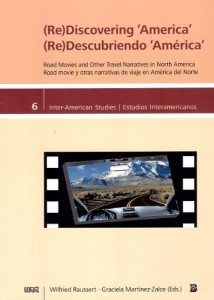This collection of essays in English and in Spanish is concerned with the travels of a genre and related issues of artistic, national, and transnational identities. In recent decades there has been a reemergence of road movies on a global scale. This volume is especially interested in the expansion of the genre in the Americas—with a particular focus on what we like to label new and alternative road movies that have come out of Mexico, the United States, and Canada. As scholars and critics we intend to rediscover ‘America’ through the lens of a transnational, inter-American approach. While, cinematically speaking, we certainly can and have to trace the filmic origins of road movies to the U.S. and Hollywood, we want to emphasize the importance of revisiting the genre within a North-South perspective and to explore how the genre has changed through the cultural flows of globalization in recent decades.
“The conventional road narrative travels from the United States to some fantastic, utopian, foreign destination, but Raussert and Martínez-Zalce’s collection (Re)Discovering ‘America’: Road Movies and Other Travel Narratives in North America examines critically this trajectory from Mexican, German, Irish, and Canadian scholarly perspectives. Their contributors discover the other Americas so often forgotten in the conventional account of the road narrative. They open the road and make it move, as it should, in two directions. A ‘Pan-American Highway’ of the mind.” (John Carlos Rowe, USC Associates’ Professor of the Humanities, University of Southern California)
VOLUME 6 of the book series:
INTER-AMERICAN STUDIES / ESTUDIOS INTERAMERICANOS
Edited by: Josef Raab (North American Studies, University of Duisburg-Essen)
and Sebastian Thies (Latin American and Media Studies, Bielefeld University)
Co-published with Wissenschaftlicher Verlag Trier, Germany
This interdisciplinary series examines national and transnational issues in the cultures, societies, and histories of the Americas. It creates a forum for a critical academic dialogue between North and South, promoting an inter-American paradigm that shifts the scholarly focus from methodological nationalism to the wider context of the Western Hemisphere.

